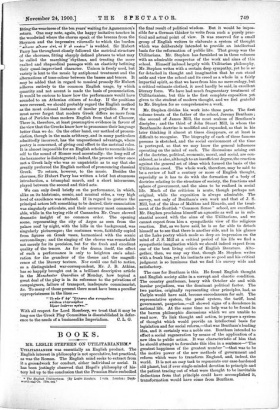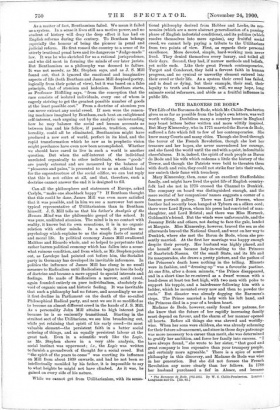BOOKS.
MR. LESLIE STEPHEN ON UTILITARIANISM.* UmrrAniaxiszs was essentially an English product. The English interest in philosophy is not speculative, but practical, as was the Roman. The English mind seeks to extract from it a groundwork for conduct, either individual or social. It has been jestingly observed that Hegel's philosophy of his- ' tory led up to•the conclusion that the Prussian State embodied " • The ngZW, Utilitarians. 'By Leslie Stephen. S rdle. London : Duck- worth and Co. fPoe. nal
the final result of political wisdom. Hut it would be impos- sible for a German thinker to write from such a 'purely prac- tical and actual point of view. It was reserved for a small group of English writers to elaborate a system Of thought which was deliberately intended to provide . an intellectual basis for the reformation of public, life. That group was the Utilitarians. Mr. Stephen has furnished us in these volumes with an admirable conspectus of the work and aims of this school. Himself imbued largely with Utilitarian philosophy, Mr. Stephen writes with a certain deep sympathy, yet he is so far detached in thought and imagination that he can stand aside and view the school and its creed as a whole in a fairly impartial spirit, so that we have from him no mere eulogy, but a critical estimate clothed, it need hardly be said, in excellent literary form. We have had much fragmentary treatment of Utilitarianism, but this is the first complete exposition yet given to the student of modern thought, and we feel grateful to Mr. Stephen for so comprehensive a work.
Mr. Stephen divides his, work into three parts. The first volume treats of the father of the school, Jeremy Bentham ; the second of James Mill, the most zealous of Bentham's disciples ; and the third of John Stuart Mill, in whom the Benthamite doctrine is modified and expanded, so that in his later thinking it almost at times disappears, or at least is difficult to recognise. The biography of each of these famous persons is sketched, and the social environment of the time is portrayed, so that we may know the general influences operating on the mind of each. The discussions arising out of the doctrine, political, economic, moral, and social, are con- sidered, as is also, although to an insufficient degree, the reaction against the general set of ideas which formed the basis of the Utilitarian creed. The whole work, therefore, may be said to be a review of half a century or more of English thought, especially as it has to do with the formation of a body of doctrine relating to the structure of society, the functions and sphere of government, and the aims to be realised in social life. Much of the criticism is acute, though perhaps not original, while the exposition is always admirable. The survey, not only of Bentham's own work and that of J. S. Mill, but of the ideas of Malthus and Ricardo, and the treat- ment of the Scottish "Common Sense" school, are excellent. Mr. Stephen proclaims himself an agnostic as well as in sub- stantial accord with the aims of the Utilitarians, and we cannot expect from him a sympathetic view of the religious reaction. But, as we have said; he is so far able to detach himself as to see that there is another side, and in his glance at the Lake poetry which made so deep an impression on the mind of J S. Mill at a critical period of his life we find a sympathetic imagination Which we should indeed expect from one of the best living critics of English literature. Alto- gether, then, we may say that, though Mr. Stephen writes with a frank bias, yet his instincts are so good and his critical judgment is so luminous that we find his survey wide and satisfactory.
The case for Bentham is this. He found English thought and English society alike in a corrupt and chaotic condition. The country gentleman, heavy with October ale and with insular prejudices, was the dominant political factor. The two parties, originally representing clear principles, had, as Carlyle would have said, become succedaneum for salt. The representative system, the penal system, the tariff, local government, pauperism,—all showed signs of a decadence in national life. At the same time no help was to be found in the barren philosophic discussions which we are unable to read now. To link thought and action, to prepare a system of thought which would provide an intellectual basis for legislation and for social reform,—that was Bentham's leading idea, and it certainly was a noble one. Bentham intended to effect a social regeneration by means of the application of a new idea to public action. , It was characteristic of him that he should attempt to formulate this idea in a sentence—" The greatest happiness of the greatest number "—that was to be the motive power of the new methods of government and reform which were to transform England, and, indeed, the world. It is not an easy task to regenerate our case-hardened old planet, but if ever single-minded devotion to principle and the patient-traiing out of what were thought to be inevitable deductions from that principle could have accomplished it, transformation would have come from Bentham. • As a matter of fact, Benthamism failed. We mean it failed as a system. In a sense it lives still as a motive power, and no student of history will deny the deep effect it has had on English reforms during the century. To Bentham belongs especially the honour' of being the pioneer in penal and judicial reform. He first roused the country to a sense of its utterly irrational penal laws and its dangerous "Judge-made" law. It was he who sketched for us a rational jurisprudence, and who did most in forming the minds of our later jurists. But Benthamism as a philosophy was doomed to failure. It was not merely, as Mr. Stephen says, and as J S Mill found out, that it ignored the emotional and imaginative aspects of life (both Bentham and James Mill despised poetry, logically from their point of view), but it was based on a false principle, that of atomism and hedonism. Bentham starts, as Professor Hoffding says, "from the conception that the race consists of isolated individuals, every one of whom is eagerly striving to get the greatest possible number of goods at the least possible cost." From a doctrine of atomism you can never extract any social creed. If men were the reason- ing machines imagined by Bentham, each bent on enlightened self-interest, each arguing out by the analytic understanding how he may balance the social and human accounts as between him and his fellow, if passion, tradition, custom, heredity, could all be eliminated, Benthamism might have produced a new sort of world, perfect in its kind, and the rapid transformation which he saw as in prophetic vision might perchance have even now been accomplished. Whether we should have cared to live in such a world is another question. But when the self-interest of the individual unrelated organically to other individuals, whose "goods" are purely external and are measured by the balance of "pleasures and pains," is presented to us as an ethical basis for the superstructure of the social edifice, we can but reply that this is not ethics at all, and that, therefore, such a doctrine cannot answer the end it is designed to fill.
Can all the philosophers and statesmen of Europe, asked Carlyle, "make one shoeblack happy " ? If Bentham thought that this could be done, James Mill was even more satisfied that it was possible, and in him we see a narrower but more typical representative of Utilitarianism than in Bentham himself. J S Mill tells us that his father's Analysis of the Human Mind was the philosophic gospel of the school. It was pure, undiluted atomism. The mind is in no contact with reality, it knows but its own sensations, it is in no organic relation with other minds. In a word, it provides no psychology which explains to us the simple facts of mental and moral life. In political economy James Mill swallowed Malthus and Ricardo whole, and so helped to perpetuate that rather barren political economy which has fallen into a some- what ruinous condition, and from which, as Mr. Stephen points out, as Laveleye had pointed out before him, the Socialist party in Germany has developed its inevitable inferences. In politics the influence of James Mill has clung in no small measure to Radicalism until Radicalism began to lose its body of doctrine and became a mere appeal to special interests and feelings. He made of Radicalism a narrow, acrid creed, again founded entirely on pure individualism, absolutely de- void of organic union and historic feeling. It was inevitable that such a philosophy had no future, and accordingly we see it first decline in Parliament on the death of the so-called Philosophical Radical party, and next we see it so modified as to become an almost different creed in the bands of J. S. Mill. As a personality John Mill attains to high interest just because he is so eminently transitional. Starting in the straitest sect of the Utilitarians, we see him broadening out, while yet retaining that spirit of his early creed—its most valuable element—the persistent faith in a better social ordering of things, and an equally persistent labour at the great task. Even in a scientific work like the Logic, as Mr. Stephen shows in a very able analysis, the social instinct was uppermost; i.e., the Logic was written to furnish a groundwork of thought for a social creed. But "the spirit of the years to come" was exerting its influence on Mill from about 1830 onwards, and had he not been so intellectually moulded by his father, it is impossible to say to what heights he might not have climbed. As it was, he gained on every side of his nature.
While we cannot get from Utilitarianism, with its sensa- TheanrarroleadeElfzodA 177.54803. By W. S. Chlide-Pemberton. tional philosophy derived from Hobbes and Locke, its eco. nomics (which are a mere abstract generalisation of a passing phase of English industrial conditions), and its politics (which resolve themselves into mere egoism), any fruitful social creed, we cannot help paying a tribute to the Utilitarians from two points of view. First, as regards their personal excellence. More devoted, simple, hard-working men never lived. They denied themselves every luxury, and toiled all their days. Second, they had, if narrow methods and beliefs, yet noble ends. Like their great French contemporaries, Turgot and Condorcet, they held a fervent faith in human progress, and no cynical or unworthy element entered into their creed or their life. As a system their creed has failed, and is dead or dying, but their example, their zeal, their loyalty to truth and to humanity, will, we may hope, long animate social reformers, and abide as a fruitful influence in public life.











































 Previous page
Previous page